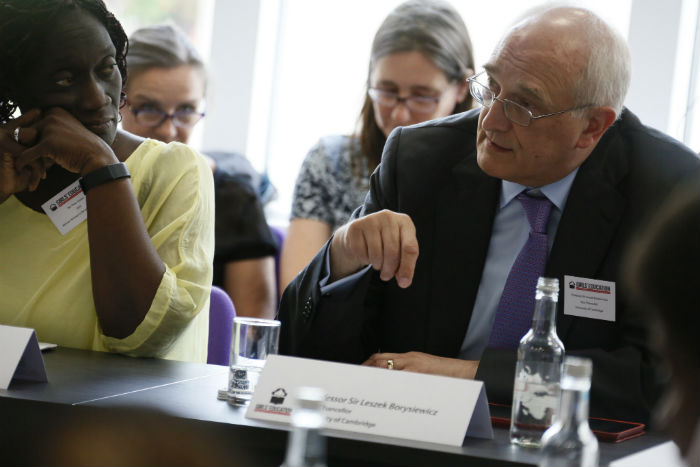By: Onche Odeh
Send to a friend
The details you provide on this page will not be used to send unsolicited email, and will not be sold to a 3rd party. See privacy policy.
Leszek Borysiewicz, the vice-chancellor of the University of Cambridge, United Kingdom, has served as chief executive of the UK’s Medical Research Council and deputy director at Imperial College London. In this interview, the biomedical researcher tells SciDev.Net about how Africa needs to fuse local policies with global efforts on scientific collaboration. He says better higher education could help the continent solve many of its problems and maximise its greatest asset — its youth.
What’s required to boost science and technology investment in Africa?
Africa is the continent with the youngest people, one full of opportunities and with an amazing amount of young talents. I am an ardent believer that this talent will drive the science and technology agenda of the future. That is why we need to harvest every opportunity not just for Africa’s benefit, but also for the benefit of the whole world. These young people are going to make a lot of contributions that’ll help all of us.
But these young talents often struggle to access education. How can the continent deal with this?
This is why you have to action things in parallel, not in series. Africa can’t afford to wait for a primary education or secondary education initiative to bear fruit, because the rest of the world is moving forward quickly. The continent needs to engage the excellent, high-quality talents in the tertiary education centres and the universities to turn them into scientific leaders in their own domains. So, you can’t just do primary or secondary education. You must also do tertiary education.
You must create an environment where economic growth can result from science and technology. This is a very complex and difficult issue, but there is a real opportunity to be able to do that, especially in some of the wealthiest African states.
Many African nations are struggling to come up with the money for higher education. What kind of encouragements can you offer political leaders?
The only way you are going to get real success here is to take the brightest and best that you’ve got and give them the opportunity to really succeed. In science and technology — and particularly that driving at economic development — it is a game of winners. That means a country must back its 100 best young students and actually ensure that the facilities are provided for them in-country. Within that there is a real risk. You have got to take some of your budget and risk that budget in high stakes. The rest needs to go towards the technical know-how required to sustain economic growth. This is much more open to central strategies and direction. And then you need to have a third pot of investment, which is providing education that supports young people and improves their livelihoods.
What role do you envision for universities in this?
The key word is autonomy. Universities should be allowed to choose who they educate, how they educate and the subjects they deem important. That doesn’t mean there should not be points of discussions. But it is a game of trust. It is a very big challenge because, of course, voters will want to know what is being delivered for their money. It’s a huge investment people have to commit to. This is where courage is needed from policymakers and scientists because they are taking decisions which may prove to be unpopular. My anxiety is that, if those investments are not made today, the continent will continue to fall behind, because the scale of investment is not as high as is theoretically possible.
Do you think Africa can produce the next Einstein?
Einstein was a brilliant scientist, but he was a loner. He did not work with teams. Modern science requires large-scale teams. What I want is the confidence of African scientists to engage in global collaboration. In my own field of biomedicine, in cases where leadership is very much with the African investigators, they now participate, showing leadership in their domains and tackling global challenges such as HIV and many other conditions. I would like to see that extended to mathematics, into physics, into Africa space programmes. With that confidence in them, when they go back to their own institutions, they will try to play a part in other international consortia. Africa has got to be part of solutions and play its part.
Thinking inwards, are African entrepreneurs responding to African needs?
When I am challenged in Cambridge University about entrepreneurship, I always refer the questioner back to my experiences in the high streets of Kampala. This is where you see entrepreneurship. Every single time somebody sells or buys something there is an opportunity. There are various individuals dealing with decisions. And that is vital for local economies as local know-how is created.
But the real paradigm shift happens when innovation and research go hand-in-hand. This needs to be widespread because these opportunities can create wealth over and above just the local environment. For that, one of the key issues is the protection of people’s intellectual properties to ensure that they can operate effectively within the global setting. Here I think the African Union has a lot of work to do by ensuring that the entrepreneurs are appropriately protected. Only then can we begin to enjoy the products of their innovations both in-country and on the global scene.
Q&As are edited for length and clarity.














